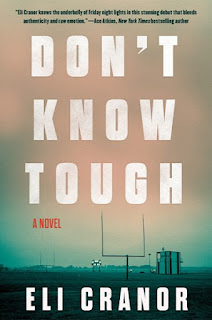 writing from Arkansas where he lives with his wife and kids. His fiction has won The Greensboro Review’s Robert Watson Literary Prize and been a runner-up for The Missouri Review’s Miller Prize. Cranor also writes a nationally syndicated sports column, “Athletic Support,” and his craft column, “Shop Talk,” appears monthly over at CrimeReads. His debut novel, Don’t Know Tough, won the Peter Lovesey First Crime Novel Contest.
writing from Arkansas where he lives with his wife and kids. His fiction has won The Greensboro Review’s Robert Watson Literary Prize and been a runner-up for The Missouri Review’s Miller Prize. Cranor also writes a nationally syndicated sports column, “Athletic Support,” and his craft column, “Shop Talk,” appears monthly over at CrimeReads. His debut novel, Don’t Know Tough, won the Peter Lovesey First Crime Novel Contest.
Cranor applied the Page 69 Test to Don't Know Tough and reported the following:
From page 69:Visit Eli Cranor's website.There’s red on my Jordans. Got red all over them. It ain’t syrup, though. I see that now. Coach do too, but he turn away, like all that blood don’t scare him one bit.On page 69 of Don't Know Tough readers come in at the very end of Chapter 7. The scene is told in the voice of Billy Lowe, a high school running back suspected of murder. At the end of the chapter, Billy is asked to apologize for fighting with a teammate, which he does, albeit begrudgingly. The lines quoted above are the last lines of the chapter.
The test works perfectly for Don't Know Tough, namely because it introduces the reader to Billy and his unique voice. The whole novel is told in alternating perspectives, with every other chapter coming back to Billy. This scene in particular carries weight because Billy is forced to do something he's not comfortable with, which is apologize to a peer. His discomfort in the situation is apparent, but he really doesn't have a choice given the situation. He's suspected of murder, and there's literally blood on his sneakers. For the first time in his young life, Billy Lowe is forced to toe the line.
Previous to this exercise, I'd never heard of "The Page 69 Test." For this specific experience, I think it works, and I could see it working on a broader spectrum as well. Most books I read have the "inciting event" hit somewhere on or before page fifty. It follows, then, that nineteen pages later, the story should be good and going, the heat of the narrative pulling the reader along.
--Marshal Zeringue





